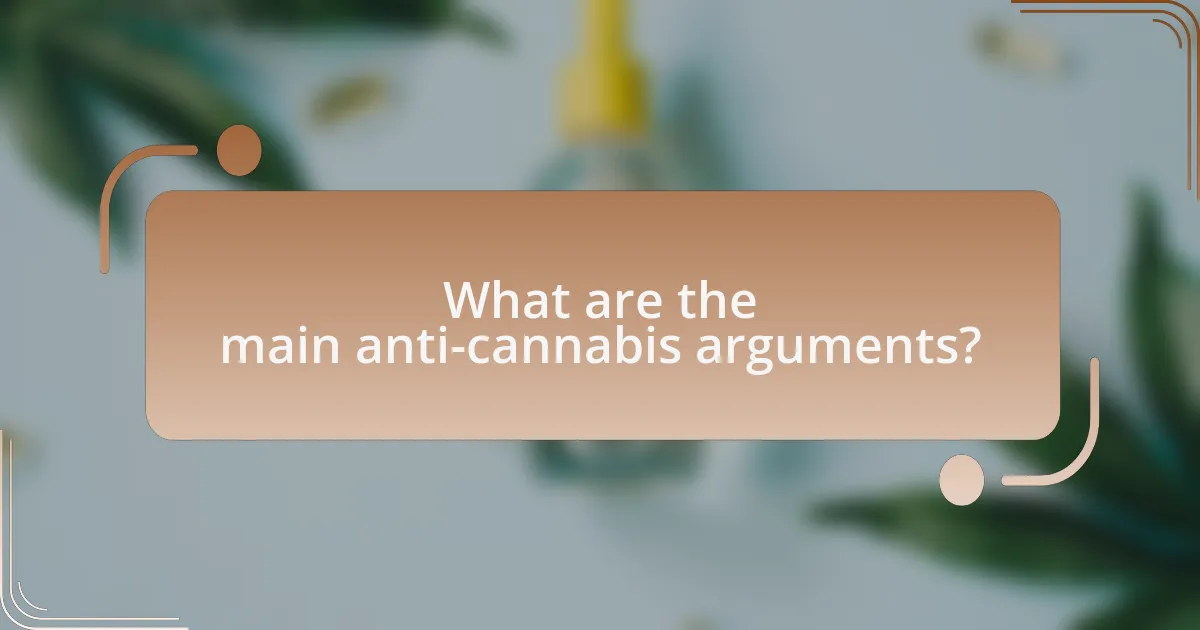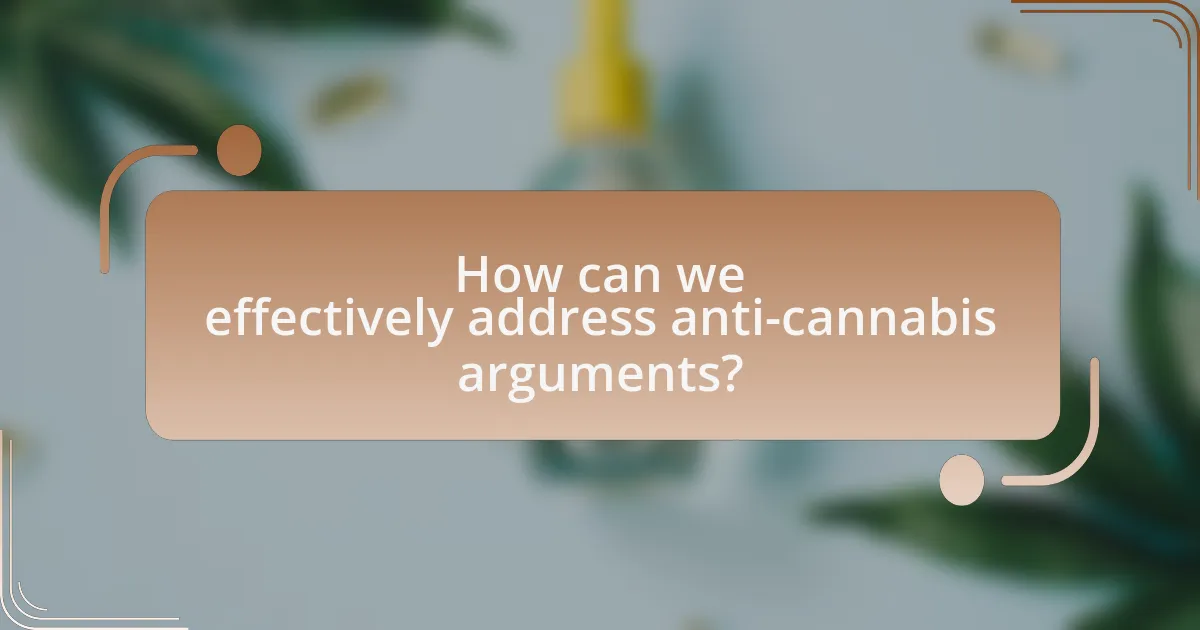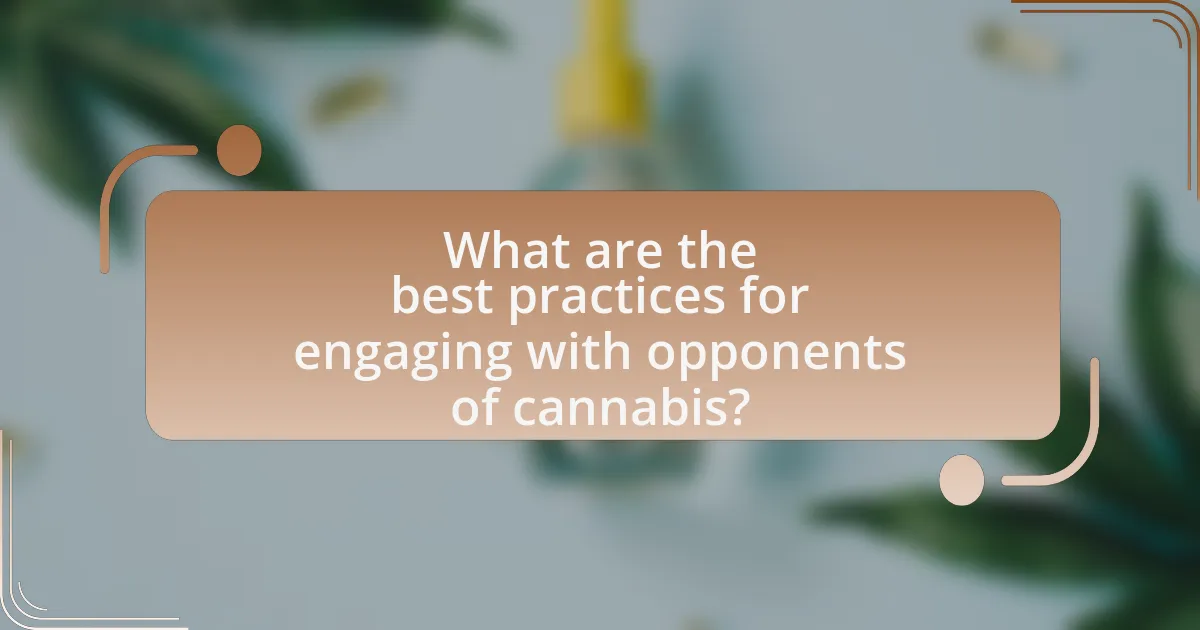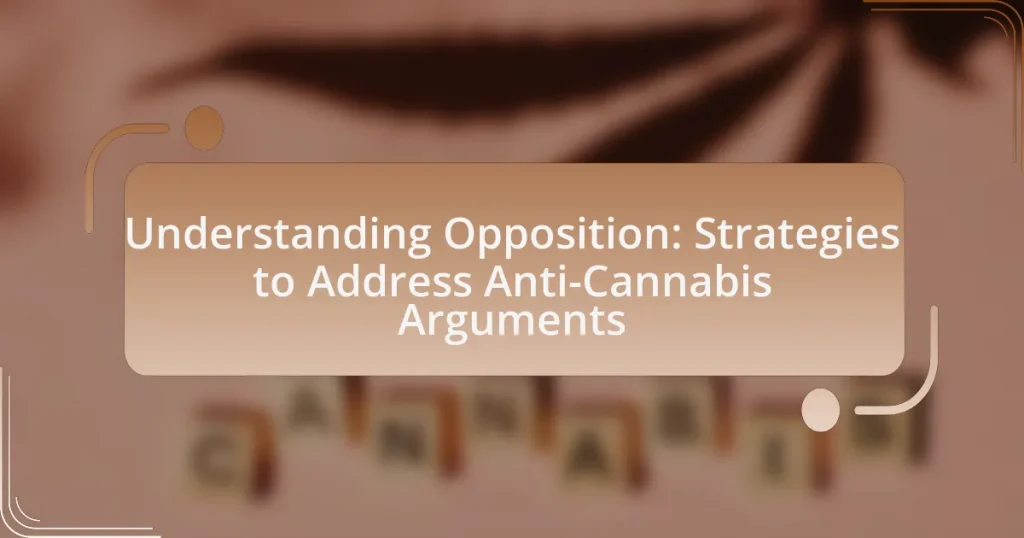The article “Understanding Opposition: Strategies to Address Anti-Cannabis Arguments” examines the primary arguments against cannabis use and legalization, focusing on public health, safety, and social implications. It highlights concerns regarding addiction, impaired driving, mental health issues, and societal impacts, while also addressing misconceptions about cannabis. The article presents evidence-based strategies to counter these arguments, emphasizing the therapeutic benefits of cannabis, its lower addiction potential compared to other substances, and the positive economic impacts of legalization. Additionally, it outlines best practices for engaging with opponents and fostering constructive dialogue to promote informed discussions about cannabis.

What are the main anti-cannabis arguments?
The main anti-cannabis arguments include concerns about public health, safety, and social implications. Critics argue that cannabis use can lead to addiction, with studies indicating that approximately 9% of users may develop a dependence, increasing to 17% for those who start in adolescence. Additionally, opponents highlight the potential for impaired driving, citing research that shows a higher risk of accidents among drivers under the influence of cannabis. There are also fears regarding mental health issues, as some studies link cannabis use to increased rates of anxiety, depression, and psychosis, particularly in vulnerable populations. Furthermore, anti-cannabis advocates often express concerns about the societal impact, including the potential for increased crime rates and the normalization of drug use among youth.
Why do some people oppose cannabis legalization?
Some people oppose cannabis legalization due to concerns about public health and safety. They argue that legalization may lead to increased usage among adolescents, potentially resulting in negative health outcomes such as impaired cognitive development and higher rates of addiction. Research from the National Institute on Drug Abuse indicates that cannabis use can affect brain development in young people, which reinforces these concerns. Additionally, opponents often cite potential increases in impaired driving incidents, with studies showing a correlation between cannabis legalization and higher rates of traffic accidents. These factors contribute to the opposition against cannabis legalization.
What are the health concerns associated with cannabis use?
Cannabis use is associated with several health concerns, including respiratory issues, mental health disorders, and potential addiction. Regular smoking of cannabis can lead to chronic bronchitis and other respiratory problems due to inhalation of harmful substances. Additionally, studies indicate that cannabis use may exacerbate or trigger mental health conditions such as anxiety, depression, and psychosis, particularly in individuals with a predisposition to these disorders. Furthermore, approximately 9% of users may develop cannabis use disorder, which can lead to dependence and withdrawal symptoms. These health risks underscore the importance of understanding the implications of cannabis consumption.
How does cannabis affect public safety and crime rates?
Cannabis legalization generally leads to a decrease in certain crime rates and does not significantly compromise public safety. Studies indicate that states with legalized cannabis have experienced reductions in violent crime and property crime rates. For instance, a 2020 study published in the journal “PLOS ONE” found that states with legalized recreational cannabis saw a 13% decrease in violent crime rates compared to states where cannabis remains illegal. Additionally, data from the FBI’s Uniform Crime Reporting Program shows that cannabis-related arrests have decreased significantly in states that have legalized it, allowing law enforcement to focus on more serious crimes. Thus, the evidence suggests that cannabis legalization can positively impact public safety and reduce crime rates.
What misconceptions exist about cannabis?
Misconceptions about cannabis include the belief that it is a gateway drug, that it causes permanent brain damage, and that it has no medical benefits. The gateway drug theory suggests that cannabis use leads to the use of harder substances; however, research from the National Institute on Drug Abuse indicates that most cannabis users do not go on to use other illicit drugs. The claim that cannabis causes permanent brain damage is also misleading; studies, such as those published in the journal “Neuropsychopharmacology,” show that while heavy use during adolescence may affect cognitive development, these effects are not necessarily permanent. Lastly, the assertion that cannabis has no medical benefits is contradicted by numerous studies, including those reviewed by the American Medical Association, which recognize its efficacy in treating conditions like chronic pain, epilepsy, and multiple sclerosis.
How is cannabis different from other substances like alcohol and tobacco?
Cannabis differs from alcohol and tobacco primarily in its chemical composition and effects on the body. While alcohol is a depressant that primarily affects the central nervous system and tobacco contains nicotine, a highly addictive stimulant, cannabis contains cannabinoids like THC and CBD, which interact with the endocannabinoid system to produce various effects, including euphoria, relaxation, and altered perception. Research indicates that cannabis has a lower potential for addiction compared to alcohol and tobacco; for instance, the National Institute on Drug Abuse reports that about 9% of cannabis users develop a dependence, compared to 15% for alcohol and 32% for tobacco. Additionally, cannabis has been shown to have therapeutic benefits, such as pain relief and anti-inflammatory properties, which are not typically associated with alcohol and tobacco.
What are the economic arguments against cannabis legalization?
Economic arguments against cannabis legalization include concerns about potential increases in healthcare costs, loss of productivity, and negative impacts on the labor market. Critics argue that legalization may lead to higher rates of cannabis-related health issues, which could burden public health systems. For instance, a study published in the Journal of Health Economics found that states with legalized cannabis experienced a rise in emergency room visits related to cannabis use, suggesting increased healthcare expenditures. Additionally, opponents claim that cannabis legalization could result in decreased workplace productivity due to impaired performance and absenteeism, which could negatively affect overall economic output. Furthermore, there are fears that legalization might lead to a decline in labor force participation, particularly among younger workers, as evidenced by research from the National Bureau of Economic Research indicating a correlation between cannabis availability and reduced employment rates among young adults.

How can we effectively address anti-cannabis arguments?
To effectively address anti-cannabis arguments, one should utilize evidence-based responses that highlight the benefits and safety of cannabis. Research indicates that cannabis can provide therapeutic benefits for conditions such as chronic pain, epilepsy, and anxiety, as demonstrated in studies published in journals like the Journal of Pain and the New England Journal of Medicine. Additionally, addressing misconceptions about cannabis, such as its potential for addiction, is crucial; the National Institute on Drug Abuse reports that the addiction rate for cannabis is lower than that of substances like alcohol and tobacco. Engaging in open dialogue and providing factual information can help counteract fears and misinformation surrounding cannabis use.
What strategies can be used to counter health-related concerns?
To counter health-related concerns regarding cannabis, strategies include presenting scientific research that demonstrates its medical benefits, emphasizing harm reduction approaches, and promoting responsible usage guidelines. For instance, studies published in journals like the Journal of the American Medical Association indicate that cannabis can effectively alleviate chronic pain and reduce the severity of certain medical conditions. Additionally, harm reduction strategies, such as educating users about dosage and potential side effects, can mitigate health risks. By providing clear, evidence-based information, advocates can address misconceptions and foster informed discussions about cannabis use.
What scientific evidence supports the safety of cannabis?
Scientific evidence supporting the safety of cannabis includes numerous studies indicating its low potential for addiction and adverse health effects compared to other substances. For instance, a comprehensive review published in the journal “Addiction” by Hall and Degenhardt (2009) found that cannabis has a lower risk of dependence than alcohol and tobacco, with only about 9% of users developing a dependence compared to 15% for alcohol and 32% for tobacco. Additionally, the National Academies of Sciences, Engineering, and Medicine (2017) reported that cannabis use is associated with a lower incidence of opioid-related deaths, suggesting its potential as a safer alternative for pain management. Furthermore, a study in “The Lancet Psychiatry” by Moore et al. (2007) concluded that cannabis does not significantly increase the risk of psychosis in the general population, reinforcing its safety profile when used responsibly.
How can personal testimonials influence public perception?
Personal testimonials can significantly influence public perception by providing relatable, firsthand accounts that resonate emotionally with individuals. These narratives often humanize complex issues, making them more accessible and understandable. For instance, research published in the Journal of Health Communication indicates that personal stories can enhance the perceived credibility of a message, leading to increased acceptance of topics like cannabis use for medical purposes. This effect is particularly pronounced when testimonials come from individuals who share similar backgrounds or experiences with the audience, fostering trust and empathy.
How can we debunk common misconceptions about cannabis?
To debunk common misconceptions about cannabis, it is essential to provide factual information that counters these beliefs. For instance, one prevalent misconception is that cannabis use leads to addiction; however, research from the National Institute on Drug Abuse indicates that only about 9% of users develop a dependence, which is lower than substances like alcohol and nicotine. Additionally, the belief that cannabis causes cognitive decline is challenged by studies showing that, in moderation, it does not impair cognitive function in adults. By presenting these facts and referencing credible sources, misconceptions can be effectively addressed and clarified.
What role does education play in changing perceptions?
Education plays a crucial role in changing perceptions by providing individuals with accurate information and fostering critical thinking skills. Through structured learning, education can challenge misconceptions and biases, particularly regarding complex topics like cannabis use. For instance, studies have shown that educational programs about cannabis can significantly reduce stigma and misinformation, leading to more informed opinions. A report by the National Academies of Sciences, Engineering, and Medicine found that educational interventions can effectively alter public attitudes towards cannabis, highlighting the importance of evidence-based information in shaping perceptions.
How can we use data to challenge economic arguments against cannabis?
Data can be used to challenge economic arguments against cannabis by providing evidence of its positive economic impact, such as job creation and tax revenue generation. For instance, a report from the Colorado Department of Revenue indicated that cannabis sales generated over $1.5 billion in revenue and contributed approximately $387 million in tax revenue in 2020 alone. Additionally, studies have shown that legal cannabis markets create thousands of jobs; for example, the Leafly Jobs Report estimated that the cannabis industry supported over 321,000 full-time jobs in the U.S. in 2021. These data points counter claims that cannabis legalization harms the economy by demonstrating its potential to stimulate economic growth and provide substantial tax benefits.

What are the best practices for engaging with opponents of cannabis?
The best practices for engaging with opponents of cannabis include active listening, presenting factual information, and fostering respectful dialogue. Active listening allows for understanding the concerns and misconceptions held by opponents, which can help tailor responses effectively. Presenting factual information, such as data from studies showing the medical benefits of cannabis or its economic impact, can counteract misinformation. For instance, a 2017 study published in the Journal of the American Medical Association found that states with legal cannabis saw a reduction in opioid-related deaths, highlighting a public health benefit. Fostering respectful dialogue encourages open communication and reduces defensiveness, making it more likely for opponents to consider alternative viewpoints.
How can advocates communicate effectively with skeptics?
Advocates can communicate effectively with skeptics by employing active listening, presenting credible evidence, and fostering respectful dialogue. Active listening allows advocates to understand the concerns and misconceptions of skeptics, which can help tailor responses that address specific doubts. Presenting credible evidence, such as scientific studies that demonstrate the benefits of cannabis, reinforces the advocate’s position and counters misinformation. For instance, a study published in the Journal of the American Medical Association found that cannabis can be effective in treating chronic pain, which may resonate with skeptics concerned about medical applications. Fostering respectful dialogue encourages open communication, making skeptics more receptive to new information and perspectives.
What techniques can foster constructive dialogue?
Active listening, open-ended questions, and empathy are techniques that can foster constructive dialogue. Active listening involves fully concentrating on the speaker, which encourages them to express their thoughts without interruption, thereby creating a respectful environment. Open-ended questions invite deeper responses and promote exploration of differing viewpoints, facilitating a more comprehensive understanding of the opposition’s perspective. Empathy allows participants to acknowledge and validate each other’s feelings and experiences, which can reduce defensiveness and promote collaboration. Research indicates that these techniques enhance communication effectiveness and lead to more productive discussions, particularly in contentious topics like cannabis legalization.
How can empathy and understanding improve discussions?
Empathy and understanding can significantly improve discussions by fostering a respectful and open environment that encourages dialogue. When participants actively listen and acknowledge each other’s perspectives, it reduces defensiveness and promotes collaboration. Research indicates that empathetic communication leads to more constructive conversations, as it allows individuals to feel heard and valued, which can lead to a greater willingness to consider opposing viewpoints. For instance, a study published in the Journal of Personality and Social Psychology found that empathy can enhance conflict resolution by facilitating mutual understanding and reducing hostility. This approach is particularly relevant in discussions surrounding contentious topics, such as cannabis legalization, where differing opinions often lead to polarized debates.
What resources are available for further education on cannabis?
Numerous resources are available for further education on cannabis, including academic journals, online courses, and government publications. Academic journals such as the Journal of Cannabis Research provide peer-reviewed studies on cannabis-related topics, while platforms like Coursera and Udemy offer courses on cannabis cultivation, medicinal uses, and legal issues. Additionally, government resources like the National Institute on Drug Abuse (NIDA) provide comprehensive information on cannabis research and its effects. These resources collectively support a deeper understanding of cannabis and its implications in various contexts.
Where can individuals find credible information about cannabis research?
Individuals can find credible information about cannabis research through reputable sources such as peer-reviewed journals, government health agencies, and academic institutions. For instance, the National Institutes of Health (NIH) provides extensive research on cannabis through its National Library of Medicine, which includes access to studies published in journals like the Journal of Cannabis Research. Additionally, organizations like the American Medical Association and the World Health Organization publish reports and guidelines based on scientific evidence regarding cannabis. These sources ensure that the information is accurate, reliable, and based on rigorous scientific methodology.
What organizations support cannabis advocacy and education?
Organizations that support cannabis advocacy and education include the National Organization for the Reform of Marijuana Laws (NORML), the Marijuana Policy Project (MPP), and the Drug Policy Alliance (DPA). NORML focuses on reforming cannabis laws and promoting responsible use, while MPP works to change marijuana laws at the state and federal levels. The DPA advocates for drug policy reform and emphasizes the importance of education regarding the benefits and risks of cannabis use. These organizations provide resources, research, and advocacy efforts to promote informed discussions about cannabis.


